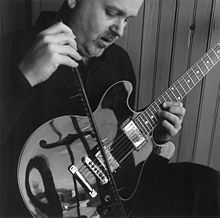Scott Fields
| Scott Fields | |
|---|---|
 Chicago, 2001, by Whitney Bradshaw | |
| Background information | |
| Born | September 30, 1956 |
| Origin | Chicago, Illinois USA |
| Genres | avant-jazz, New Music |
| Years active | 1970s — present |
| Associated acts |
Scott Fields Ensemble Scott Fields Freetet Elliott Sharp and Scott Fields Scott Fields and Stephen Rath Jeff Parker and Scott Fields James Choice Orchestra Multiple Joy(ce) Orchestra |
| Notable instruments | |
| guitar | |
Scott Fields (born September 30, 1956 in Chicago, Illinois), is a guitarist, composer and band leader. He is best known for his attempts to blend music that is composed and music that is written and for his modular pieces (see 48 Motives, 96 Gestures, and "OZZO"). He works primarily in avant-garde jazz, experimental music, and New Music.[1]
Biography
Fields was born and raised in Chicago, Illinois. He started as a self-taught rock musician[1] but soon was influenced by the musicians of the Association for the Advancement for Creative Musicians, which was active in the Hyde Park neighborhood in which he grew up. Later he studied classical guitar, jazz guitar, music composition and music theory.[2] In 1973 Fields co-founded the power avant-jazz trio Life Rhythms. When the group disbanded two years later he played sporadically, but soon was institutionalized for an extended period. He all but quit music until 1989.[2]
Since then he has performed and composed actively. His ensembles and partnerships have included such musicians as Marilyn Crispell, Hamid Drake, John Hollenbeck, Joseph Jarman, Myra Melford, Jeff Parker, and Elliott Sharp.[3]
Fields is recognized as a specialist in extended techniques for guitar.[4]
Selected discography
- 1993 - Running with Scissors (Geode)
- 1995 - Fugu (Clean Feed Records)
- 1996 - 48 Motives (Cadence Jazz Records)
- 1996 - Disaster at Sea (Music & Arts)
- 1997 - Five Frozen Eggs (Music & Arts)
- 1997 - Sonotropism (Music & Arts)
- 1999 - Dénouement (Clean Feed Records)
- 1999 - Fields-Houle-Roebke: Hornets Collage (Nuscope)
- 2001 - 96 Gestures (Composers Recordings, Inc.)
- 2001 - Mamet (Delmark Records)
- 2001 - this that (Accretions)
- 2002 - From the Diary of Dog Drexel (Rossbin)
- 2004 - christangelfox (482 Music)
- 2004 - Jeff Parker and Scott Fields: Song Songs Song (Delmark Records)
- 2007 - We Were The Phliks (Rogue Art)
- 2007 - Beckett (Clean Feed Records)
- 2008 - Bitter Love Songs (Clean Feed Records)
- 2008 - Elliott Sharp and Scott Fields: Scharfefelder (Clean Feed Records)
- 2008 - Drawings (Creative Sources)
- 2008 - Music for the radio program This American Life (NEOS Music)
- 2009 - Samuel (New World Records)
- 2010 - Elliott Sharp and Scott Fields: Afiadacampos (NEOS Music)
- 2010 - Scott Fields and Stephan Rath: what we talk (NEOS Music)
- 2011 - Scott Fields and Matthias Schubert: "Minaret Minuets" (Clean Feed Records)
- 2011 - "Frail Lumber" (NotTwo Records)
- 2011 - Scott Fields and the Multiple Joyce Orchestra: "Moersbow/OZZO" (Clean Feed Records)
- 2013 - Scott Fields Freetet: "Kintsugi" (Between the Lines)
- 2013 - Scott Fields and Jeffrey Lependorf: "Everything is in the Instructions" (Ayler)
References
- ↑ 1.0 1.1 Ludwig von Trier (September 2003). "Scott Fields Interview". Cadence Magazine 29.
- ↑ 2.0 2.1 Harvey Pekar (March 1997). Jazziz Magazine.
- ↑ Joslyn Layne. Scott Fields biography at Allmusic. AllMusic.com. Retrieved on 2007-01-03.
- ↑ http://preparedguitar.blogspot.de/2013/11/scott-fields-13-questions.html
External links
| Wikimedia Commons has media related to Scott Fields. |
|